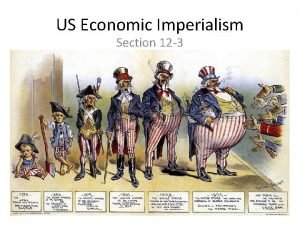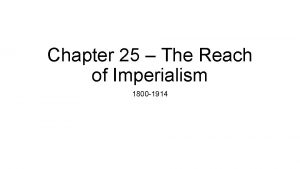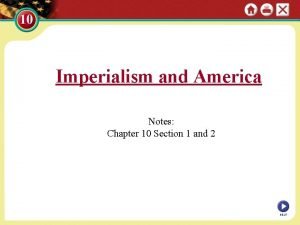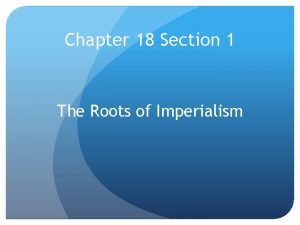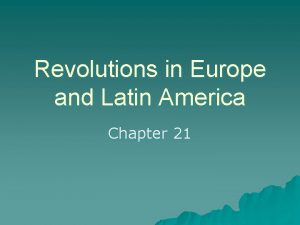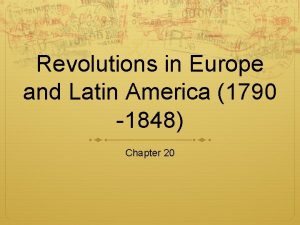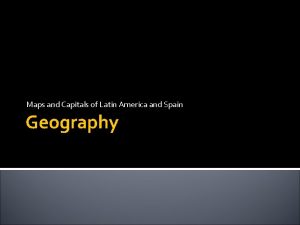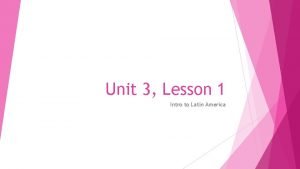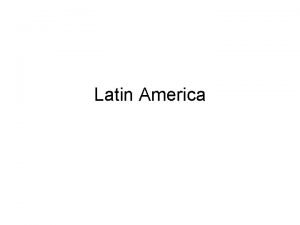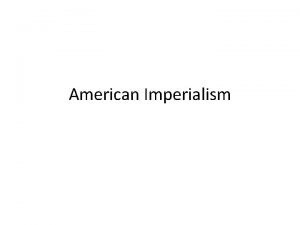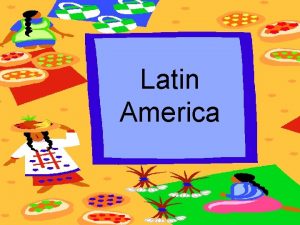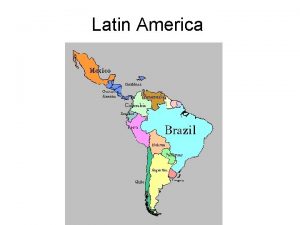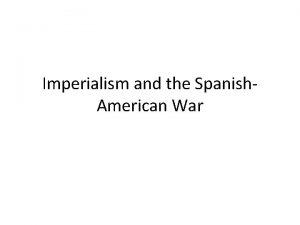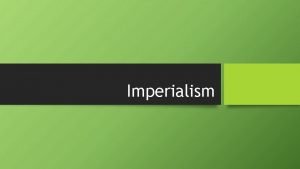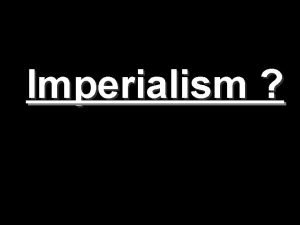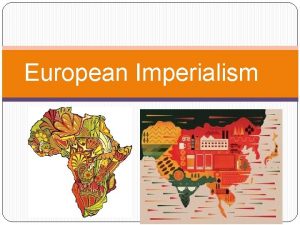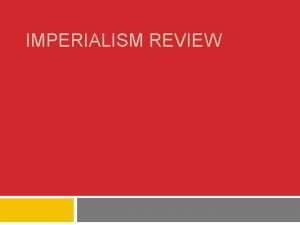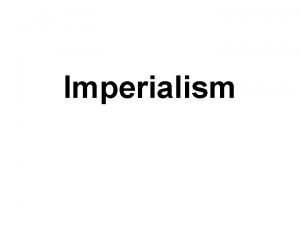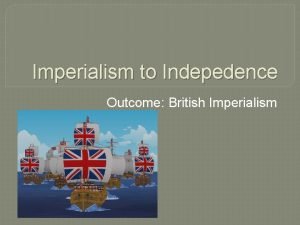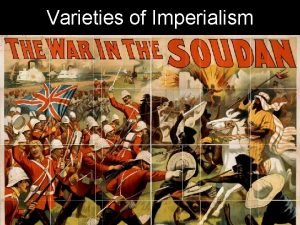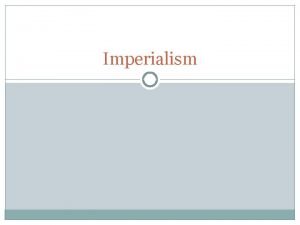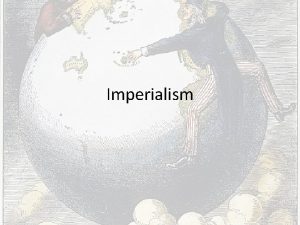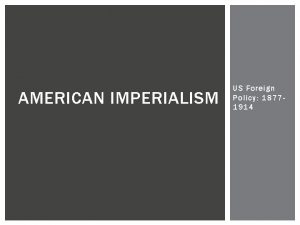Latin America Imperialism in Latin America and the













![Monroe Doctrine (1823) [Spheres of Influence] “. . . the American continents, by the Monroe Doctrine (1823) [Spheres of Influence] “. . . the American continents, by the](https://slidetodoc.com/presentation_image_h2/2bb7c6767046ba7c3cf445b629eb4b42/image-14.jpg)
















- Slides: 30

Latin America Imperialism in Latin America and the Panama Canal

Speak softly and carry a big stick!

Aim: Did the U. S. have a right to interfere in Latin America’s affairs? Key Terms: Monroe Doctrine (1823) Roosevelt Corollary (1904) Hay Herron Treaty (1903) Hay-Bunau-Varilla Treaty (1903) Dollar Diplomacy (1912) Good Neighbor Policy (1933) Isthmus Theodore Roosevelt Panama Canal Essential Questions: (1)What role did the U. S. play in the Panamanian revolution? (2)To what degree was U. S. foreign policy shaped by economic interests? (3)Was the U. S. policy in Latin America/Panama a policy of political aggression?

What is the best way to get from one side of the U. S. to the other, by ship?

Why would the U. S. want to build a canal?

Hay Herran Treaty, 1903 Treaty signed by U. S. Secretary of State John Hay and Tomás Herrán of Colombia. Ratified by U. S. senate but NOT by Senate of Colombia. It would have allowed the United States a renewable lease of 100 years on a six-mile-wide strip across the isthmus of Panama (then part of Colombia) for $10 million and an annual payment of $250, 000, both payments being in gold coin.

Hay-Bunau Varilla Treaty, 1903 AFTER Panama gets their independence from Colombia, they sign a treaty with the United States: "The Republic of Panama grants to the United States in perpetuity (endless) the use, occupation, and control of a zone of land underwater for the construction, maintenance, operation, sanitation and protection of said Canal of the width of 10 miles extending to the distance of five miles on each side of the center line of the route of the canal to be constructed. . . United States agrees to pay Panama $10, 000 in gold coins at the beginning of the settlement then an additional $250, 000 nine years after the opening date, annually. ”

Roosevelt Corollary to the Monroe Doctrine, 1904 “It is not true that the United States feels any land hunger or entertains any projects as regards the other nations of the Western Hemisphere. . . All that this country desires is to see the neighboring countries stable, orderly and prosperous…Chronic wrongdoing, or an impotence which results in a general loosening of the ties of civilized society, may in America, as elsewhere, ultimately require intervention…[and] force the United States, however reluctantly, in flagrant cases of such wrongdoing or impotence, to the exercise of an internal police power. ”

Roosevelt Corollary: During this time, Theodore Roosevelt added to the idea of the “Monroe Doctrine” by writing the Roosevelt Corollary which said it is America’s job to protect and take care of other countries in Latin America should be the “international police power” of these countries.

Good Neighbor Policy, 1933 “In the field of world policy I would dedicate this nation to the policy of the good neighbor—the neighbor who resolutely respects himself and, because he does so, respects the rights of others. ” - Theodore Roosevelt

William Howard Taft’s Policy of “Dollar Diplomacy, ” 1912 “In Central America the aim has been to help such countries as Nicaragua and Honduras to help themselves. [These countries] are the immediate beneficiaries [of the United Stats’ actions]. The nation’s benefit to the United States is twofold. First, it is obvious that the Monroe Doctrine is more vital in the neighborhood of the Panama Canal and the zone of the Caribbean than anywhere else. . . It is therefore essential that the countries within that sphere shall be removed from the jeopardy involved by heavy foreign debt and chaotic national finances and from the ever present danger of international complications due to disorder at home. Hence the United States has been glad to encourage and support American bankers who were willing to lend a helping hand to the financial rehabilitation and the protection of such countries because this financial rehabilitation…removes the menace of foreign creditors…”

Taft’s Dollar Diplomacy SOUTH AMERICA • Invest money in Latin America by starting businesses there. • Improve financial opportunities for American businesses. • Use private capital to further U. S. interests overseas. • Expected result: the U. S. should create stability and order abroad that would best promote America’s commercial interests.

“The World’s Constable”
![Monroe Doctrine 1823 Spheres of Influence the American continents by the Monroe Doctrine (1823) [Spheres of Influence] “. . . the American continents, by the](https://slidetodoc.com/presentation_image_h2/2bb7c6767046ba7c3cf445b629eb4b42/image-14.jpg)
Monroe Doctrine (1823) [Spheres of Influence] “. . . the American continents, by the free and independent condition which they have assumed and maintain, are henceforth not to be considered as subjects for future colonization by any European powers… In the wars of European powers. . . we have never taken any part, nor does it comport (agree) with our policy to do so. It is only when our rights are invaded or that we make preparation for our defense. . . With governments who have declared their independence and maintain it, and whose independence we have acknowledged, we could not view any interposition (intervention) for the purpose of oppressing them or controlling their destiny, by any European power in any other light than as a manifestation of an unfriendly position toward the United States… It is still the true policy of the U. S. to leave these nations to themselves, in hope that other powers will continue to do the same. ”

History of a Canal by Pablo Neruda (adapted) Panama, your geography granted you a gift that no other land was given: two oceans pushed forward to meet you: the cordillera [chain of mountains] tapered naturally: And so, small Panama, little sister, they cut our figure as if it were cheese and then ate and left you like gnawed olive pit. through that river the world was to arrive spilling fortune on your sand, but men from other parts spilled nothing but whiskey since they mortgaged your waistline: and everything follows as it was planned by devils and their lies: with their money they built the canal, they dug the earth with your blood and now dollars are sent to New York leaving you the graves.



“The News Reaches Bogota” W. A. Rogers, New York Herald, December 1903 Theodore Roosevelt shovels dirt from the Panama Canal onto Bogota, Colombia, after the U. S. supported Panama's revolution for independence from Colombia in exchange for control of the Canal Zone.

The Panama Canal






Event/ Policy 1. Platt Amendment 2. Roosevelt Corollary 3. Dollar Diplomacy 4. Panama Canal US Actions/Policy Was the US justified?

Task: You and your team are American Reporters. You must discuss the issue of Panama and the canal. You are to do this as a group – figure out ideas, write it together, have one person be the scribe. You have to provide the facts. Be sure to include the opinion of leadership and feel free to “interview” any relevant characters (Congress members, Presidents, etc. ) who might have an opinion or statement about the circumstances. Use loose leaf. Give your newspaper a name, give yourselves a non de plume, and give your article a title!

THE PANAMA CANAL WAS JUSTIFIED BECAUSE NOT JUSTIFIED BECAUSE

Show The Panama Deception Was it justified?

In addition to $400 million in financial costs, the loss of good will toward America was incalculable. The English author James Bryce referred to the project as “the greatest liberty Man has ever taken with Nature. ” F-Cast to calculate or predict (some future event or condition) usually as a result of study and analysis of available pertinent data

 Why called latin america
Why called latin america South american map
South american map The reach of imperialism
The reach of imperialism Old vs new imperialism chart
Old vs new imperialism chart Causes of new imperialism
Causes of new imperialism Chapter 10 section 1 imperialism and america
Chapter 10 section 1 imperialism and america Roots of imperialism
Roots of imperialism Chapter 10 building vocabulary america claims an empire
Chapter 10 building vocabulary america claims an empire Revolutions in europe and latin america section 2 quiz
Revolutions in europe and latin america section 2 quiz Latin america physical features map
Latin america physical features map Bolivia christmas food
Bolivia christmas food Revolutions in europe and latin america
Revolutions in europe and latin america My grandpa eats honey nut cheerios periodically
My grandpa eats honey nut cheerios periodically Lesson 1 latin america africa and the middle east
Lesson 1 latin america africa and the middle east Hình ảnh bộ gõ cơ thể búng tay
Hình ảnh bộ gõ cơ thể búng tay Lp html
Lp html Bổ thể
Bổ thể Tỉ lệ cơ thể trẻ em
Tỉ lệ cơ thể trẻ em Chó sói
Chó sói Thang điểm glasgow
Thang điểm glasgow Chúa yêu trần thế alleluia
Chúa yêu trần thế alleluia Các môn thể thao bắt đầu bằng tiếng nhảy
Các môn thể thao bắt đầu bằng tiếng nhảy Thế nào là hệ số cao nhất
Thế nào là hệ số cao nhất Các châu lục và đại dương trên thế giới
Các châu lục và đại dương trên thế giới Công của trọng lực
Công của trọng lực Trời xanh đây là của chúng ta thể thơ
Trời xanh đây là của chúng ta thể thơ Mật thư tọa độ 5x5
Mật thư tọa độ 5x5 Làm thế nào để 102-1=99
Làm thế nào để 102-1=99 Phản ứng thế ankan
Phản ứng thế ankan Các châu lục và đại dương trên thế giới
Các châu lục và đại dương trên thế giới Thể thơ truyền thống
Thể thơ truyền thống

